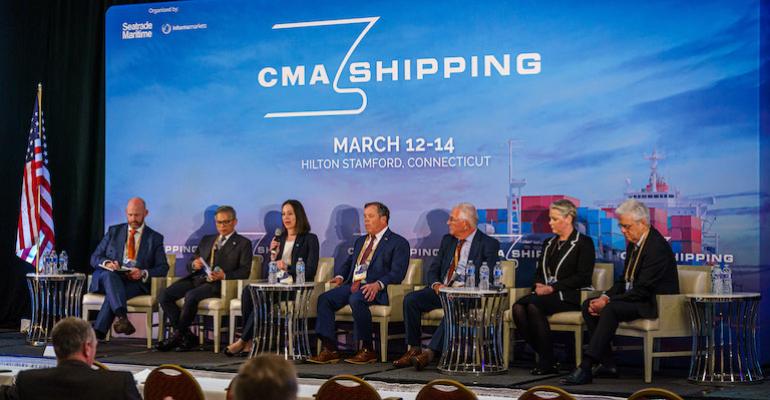A major focus of the session concerned training of seafarers; Johnson suggested that the advent of internal combustion engines aboard vessels brought about “engineer” berths, a position not seen in the era of the previous technology sailing vessels. Could a similar change be coming up with new fuels. Throughout the panel, a consensus was emerging that the rapid pace of change generally including new fuels was out of synch with the human side of the business.
Panelist Laura Donahue, Advisory Services Manager- Americas for Lloyds Register, said that more than just training and determinations of competence were required, systems need to be usable. “All the skills will be neutralized if they are up against a bad design. Let’s evaluate systems as a whole,”
“Let’s focus on human-centric design…and try to create rules that are not overly burdensome,” she said.
RINA’s Roberto Paolo Cazzulo, who became Chairman of the International Association of Class Societies (IACS) earlier in the year, highlighted efforts within IACS to promote human-centric vessel design, with the human element considered from the very start of designing systems surrounding the new fuels. After noting that seafarers would never be completely prepared to deal with all of the technologies looming ahead, he suggested cooperation and exchange of information across multiple stake-holding groups, including vessel builders, designers, Flag and Class, and that a campaign to address some of the issues discussed should be addressed by a joint campaign among industry associations.
He emphasized the prime importance of training seafarers to deal with hazards- for example, in matters related to handling ammonia where “dual-fueled” LNG carriers. “Challenges of ammonia toxicity are more complicated than the LNG rules, that are in place..” he said
Similar points were emphasized by Capt. Andre Legoubin, President of The Nautical Institute, who has a day job as a pilot assisting with ship dockings. “There’s a real disconnect now,” he said, referring to new systems being deployed where seafarers have insufficient training to operate them.
Pointing to deliveries of ammonia powered vessels coming up, he implored all concerned to “listen to the feedback from the seafarers”, and that: “Every STCW qualified person aboard must be trained for emergencies, and how to handle evacuations.” Another suggestion was that maritime cadets should be employed aboard vessels, as a measure to develop personnel with a knowledge of the new systems.
Kevin Cook, US Coast Guard Rear Admiral (retired), now working with the Marshall Islands Registry, approached the disconnect in a different way, saying: “We don’t want to get into a situation where we have environment competing against seafarers. Need to move them both along together.”
Admiral Cook also stressed the need to be innovative when answering a question on whether virtual reality can play a role in training. He added that the IMO could play an important role in developing consistency in training across geographies.
Training was also on the mind of Professor Maximo Q Meija, President of the World Maritime University (WMU)- in Malmo, Sweden. He referred to a recent WMU report re the experiences of seafarers serving on battery powered vessels in Swedish waters. Coining a new word, he referred to “Technostress” where seafarers not trained in dealing with new technologies and worrying about batteries catching fire.
“We need to open eyes to risks, pay attention to risk, and we need framework for training.” He worried aloud about what might happen a decade out when the STCW is revised. “How much will tech have advanced by then?” he wondered aloud.

